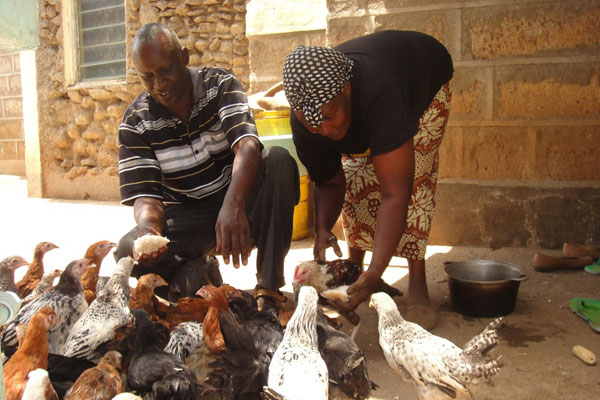Esau Kioni tends to his capsicum and sukuma wiki (collard greens) with a sharp eye, checking the back of the leaves for pests.
Observing him, one would be forgiven for thinking he has an order for vegetables from one of the big hotels in Nyeri.
But that is not the case. Kioni grows the crops and some cabbages on more than an acre mostly to feed his indigenous chickens and six dairy cows.
The former security chief of retired President Kibaki ventured into farming after retiring from the job two years ago.
He keeps close to 1,000 free range birds on half-an-acre of the farm. The poultry section is fenced with wire-mesh to prevent the birds from straying or mixing with others from the neighbourhood.
“I choose free-range for two reasons. First, because they have space to roam freely, the birds get to exercise a lot and thus produce better eggs and meat and second, this method saves on costs,” he says.
When he has a surplus of the vegetables, Kioni sells to traders in Nyeri and Othaya town, but he says this does not happen often because his livestock come first.
GOOD RETURNS
When he does sell, he charges Sh100 for a kilo of capsicum, Sh30 for a cabbage and Sh10 for a bunch of sukuma wiki.
In a day, Kioni says he feeds three quarters of a wheelbarrow of capsicum to the chickens in the morning. The capsicum is chopped into pieces and placed in a trough in the coop. During the day, the chickens are treated to a wheelbarrow of sukuma wiki.
The vegetables are tied into bunches and hung in the coop just within reach so that the birds have to jump to get a bite. “This way, the birds are kept preoccupied, preventing cannibalism,” he says.
Kioni says the capsicum, sukuma wiki and cabbage should be fed to the chickens while fresh.
However, the cabbages and sukuma wiki for the cows are kept in a dry place for two days before it being chopped and fed to the animals.
He says the crops must be dry to prevent diarrhoea in the animals.
John Wambugu, an agronomist at Wambugu Agricultural Training Centre in Nyeri, says capsicum and other types of pepper help prevent diseases in birds and animals.
INCREASED EGG YIELDS
“The crop has chemicals that keep livestock healthy.
‘‘Besides that, chickens need greens like cabbage and sukuma wiki because the crops have vitamins, calcium and zinc,” he says.
Capsicum, on the other hand, compels layers to drink plenty of water, aiding egg production and general health.
Kioni says since he started feeding capsicum to his birds, egg production has increased from 76 trays to 133 every three days.
He sells eggs for Sh20 each and hatches the others. The mature chickens are sold in Nairobi for Sh450.
From the six cows, he gets about 100 litres of milk a day that he sells to Kenya Cooperative Creameries in Nyeri.
Apart from keeping chickens, he also rears 15 guinea fowl, 10 ducks, 10 geese and 20 bantams.
According to Kioni, he got the idea of feeding his chickens with capsicum from a specialist at Kenya Agricultural and Livestock Research Institute.









Great hacks for poultry farmers.